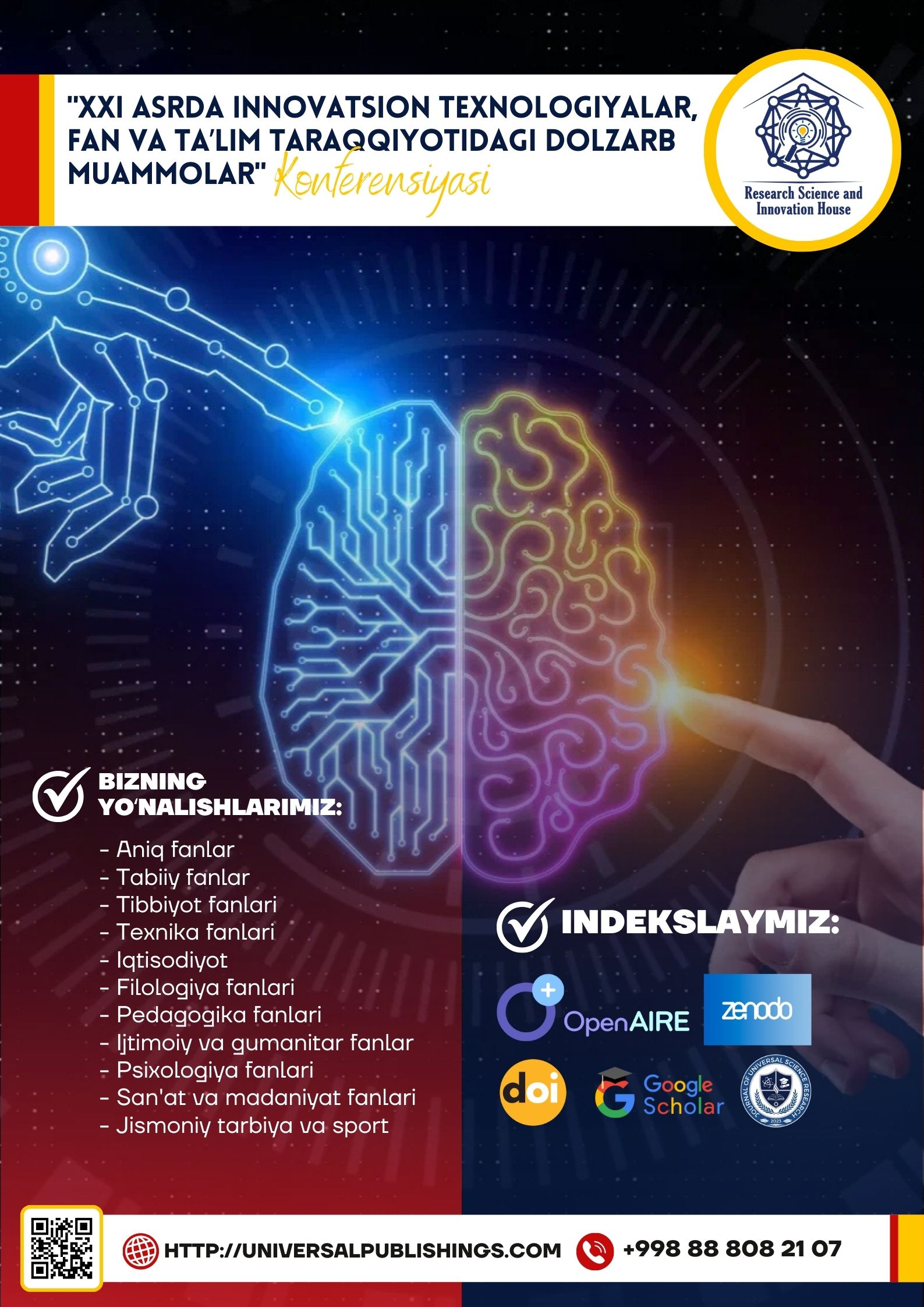Abstract
This article provides an in-depth exploration of nouns and their grammatical categories, highlighting their essential role in language structure and communication. It begins by categorizing nouns into types such as proper, common, concrete, abstract, countable, uncountable, and collective, explaining their distinct functions in language. The article then delves into various grammatical categories that shape nouns, including number, gender, case, definiteness, countability, and animacy, emphasizing how these categories influence a noun's use in a sentence. Furthermore, the article discusses the syntactical roles of nouns as subjects, objects, complements, and modifiers within sentence structures. The conclusion reinforces the importance of understanding nouns in improving linguistic proficiency and appreciating linguistic diversity. This resource is valuable for language learners, linguists, and anyone interested in the intricacies of grammar and sentence formation.References
1. Carnie, A. (2013). Syntax: A Generative Introduction (3rd ed.). Wiley-Blackwell.
2. Greenbaum, S., & Quirk, R. (1990). A Student's Grammar of the English Language. Longman.
3. Hudson, R. (1984). Word Grammar. Basil Blackwell.
4. Radford, A. (2009). Analysing English Sentences: A Minimalist Introduction. Cambridge University Press.
5. Stump, G. T. (2001). Inflectional Morphology: A Theory of Paradigm Structure. Cambridge University Press.
6. Yule, G. (2016). The Study of Language (7th ed.). Cambridge University Press.
7. Zwicky, A. M., & Pullum, G. K. (1986). The Principles of English Grammar: An Introduction. MIT Press.
8. Teshaboyeva, N., & Mamayoqubova, S. (2020). COMMUNICATIVE APPROACH TO LANGUAGE TEACHING. In МОЛОДОЙ ИССЛЕДОВАТЕЛЬ: ВЫЗОВЫ И ПЕРСПЕКТИВЫ (pp. 409-414).
9. Teshaboyeva, N. (2020). LINGUISTIC PERSONALITY, ITS STRUCTURAL CHARACTERISTICS IN THE NEW PERSPECTIVE DIRECTIONS. In МОЛОДОЙ ИССЛЕДОВАТЕЛЬ: ВЫЗОВЫ И ПЕРСПЕКТИВЫ (pp. 415-420).
10. Teshaboyeva, N. Z. (2019). TEACHING ENGLISH THROUGH LITERATURE INTESL AND TEFL CLASSROOMS. In СОВРЕМЕННЫЕ ТЕХНОЛОГИИ: АКТУАЛЬНЫЕ ВОПРОСЫ, ДОСТИЖЕНИЯ И ИННОВАЦИИ (pp. 82-84).
11. Хидирова, Д., & Тешабоева, Н. (2022). Pedagogical conditions for the development of the healthy thinking in students. Zamonaviy innovatsion tadqiqotlarning dolzarb muammolari va rivojlanish tendensiyalari: yechimlar va istiqbollar, 1(1), 120-122.
12. Gaybullayeva, N. D. K., & Kizi, T. N. Z. (2022). THE ROLE OF INNOVATIVE METHODS FOR LISTENING COMPREHENSION IN TEACHING LANGUAGE LEARNERS FOREIGN LANGUAGES AND MAINLY ENGLISH. Central Asian Research Journal for Interdisciplinary Studies (CARJIS), 2(10), 8-10.
13. Teshaboyeva Nafisa Zubaydulla qizi, Jurayev Muhammadrahim Murod o’g’li, & Mamirova Munisa Rajab qizi. (2021). Language Learning Culturally and the Role of Literature in Teaching Process. Central Asian Journal of Theoretical and Applied Science, 2(3), 1-5. Retrieved from https://www.cajotas.centralasianstudies.org/index.php/CAJOTAS/article/view/84
14. Teshaboyeva, N. (2023). THE IMPORTANCE OF TOURISM IN PRESENT DAY. Журнал иностранных языков и лингвистики, 5(5).
15. Teshaboyeva, N. (2023). THE MODERN INNOVATIVE TECHNOLOGIES IN TEACHING FOREIGN LANGUAGES. Журнал иностранных языков и лингвистики, 5(5).
16. Teshaboyeva, N. Z. (2023, November). Adjective word group and its types. In " Conference on Universal Science Research 2023" (Vol. 1, No. 11, pp. 59-61).
17. Teshaboyeva, N. Z. (2023, November). Modifications of Consonants in Connected speech. In " Conference on Universal Science Research 2023" (Vol. 1, No. 11, pp. 7-9).
18. Teshaboyeva, N., & Rayimberdiyev, S. (2023, May). THE IMPORTANCE OF USING MULTIMEDIA TECHNOLOGY IN TEACHING ENGLISH CLASSES. In Academic International Conference on Multi-Disciplinary Studies and Education (Vol. 1, No. 8, pp. 149-153).
19. Nafisa, T., & Marina, S. (2023). TEACHING AND LEARNING OF ENGLISH VOCABULARY IN TESL AND TEFL CLASSROOMS. International Journal of Contemporary Scientific and Technical Research, 465-469.
20. Teshaboyeva Nafisa Zubaydulla kizi, & Akramov Ibrohimjon. (2023). WORD FORMATION. COMPOUNDING. "XXI ASRDA INNOVATSION TEXNOLOGIYALAR, FAN VA TAʼLIM TARAQQIYOTIDAGI DOLZARB MUAMMOLAR" Nomli Respublika Ilmiy-Amaliy Konferensiyasi, 1(12), 109–113. Retrieved from https://universalpublishings.com/index.php/itfttdm/article/view/3187
21. Teshaboyeva, N., & Yakubova, N. (2023). CHANGES OF MEANING OF WORDS. Центральноазиатский журнал образования и инноваций, 2(12), 126-129.
22. Sharifova Dinora Tohir qizi, & Teshaboyeva Nafisa. (2023). “ NOUNS AND THEIR GRAMMATICAL CATEGORIES”. Новости образования: исследование в XXI веке, 2(16), 292–297. извлечено от http://nauchniyimpuls.ru/index.php/noiv/article/view/13128
23. Teshaboyeva Nafisa Zubaydulla kizi, & Akramov Ibrohimjon. (2023). WORD FORMATION. COMPOUNDING. "XXI ASRDA INNOVATSION TEXNOLOGIYALAR, FAN VA TAʼLIM TARAQQIYOTIDAGI DOLZARB MUAMMOLAR" Nomli Respublika Ilmiy-Amaliy Konferensiyasi, 1(12), 109–113. Retrieved from https://universalpublishings.com/index.php/itfttdm/article/view/3187
24. Qodirova Aziza Yunusovna, & Teshaboyeva Nafisa Zubaydulla qizi. (2023). “VERBS AND THEIR GRAMMATICAL CATEGORIES”. Новости образования: исследование в XXI веке, 2(16), 280–283. извлечено от http://nauchniyimpuls.ru/index.php/noiv/article/view/13126
25. Tuxtayeva Aziza Ilhom qizi, & Teshaboyeva Nafisa. (2023). Word Formation: Compounding . "Conference on Universal Science Research 2023", 1(12), 113–115. Retrieved from https://universalpublishings.com/index.php/cusr/article/view/3185
26. Teshaboyeva Nafisa Zubaydulla, & Iskandarova Sarvinoz Shukurullo qizi. (2023). THE CLASSIFICATION OF SYNONYMS AND THEIR SPECIFIC FEATURES. "XXI ASRDA INNOVATSION TEXNOLOGIYALAR, FAN VA TAʼLIM TARAQQIYOTIDAGI DOLZARB MUAMMOLAR" Nomli Respublika Ilmiy-Amaliy Konferensiyasi, 1(12), 126–131. Retrieved from https://universalpublishings.com/index.php/itfttdm/article/view/3191
27. Тешабоева, Н. (2023). Teaching writing as a major part of productive skills in mixed ability classes . Информатика и инженерные технологии, 1(2), 652–656. извлечено от https://inlibrary.uz/index.php/computer-engineering/article/view/25759
28. Teshaboyeva, N., & Yakubova, N. (2023). WORD FORMATION. COMPOUNDING. Development of pedagogical technologies in modern sciences, 2(12), 187-192.
29. Teshaboyeva, N. (2023). Compound sentences in the English language. Yangi O'zbekiston taraqqiyotida tadqiqotlarni o'rni va rivojlanish omillari, 2(2), 68-70.
30. Nafisa, T. (2023). THE USA ECONOMY, INDUSTRY, MANUFACTURING AND NATURAL RESOURCES OF GREAT BRITAIN. INTERNATIONAL JOURNAL OF RECENTLY SCIENTIFIC RESEARCHER'S THEORY, 1(9), 94-97.
31. Nafisa, T. (2023, December). Secondary ways of word formation. In " Conference on Universal Science Research 2023" (Vol. 1, No. 12, pp. 109-112).
32. Nafisa, T. (2023). VOWELS AND THEIR MODIFACATIONS. Новости образования: исследование в XXI веке, 2(16), 298-305.
33. Nafisa, T. (2023, December). Secondary ways of word formation. In " Conference on Universal Science Research 2023" (Vol. 1, No. 12, pp. 109-112).
34. Nafisa, T. (2023). THE EDUCATION SYSTEM OF THE USA: PRESCHOOL EDUCATION, SECONDARY AND HIGHER EDUCATION, SCHOOL FORMS. The Role of Exact Sciences in the Era of Modern Development, 1(6), 53-57.
35. Qizi, T. N. Z., & Umedovich, M. Y. (2023). AMERICAN-BASED PRONUNCIATION STANDARDS OF ENGLISH. Scientific Impulse, 2(15), 563-567.
36. Nafisa, T. (2023, December). Word Formation: Compounding. In " Conference on Universal Science Research 2023" (Vol. 1, No. 12, pp. 113-115).
37. Nafisa, T. (2023). NOUNS AND THEIR GRAMMATICAL CATEGORIES. Новости образования: исследование в XXI веке, 2(16), 292-297.

